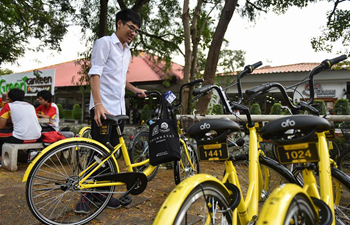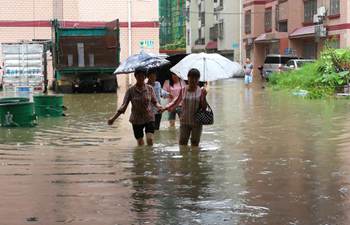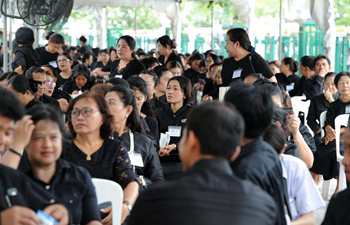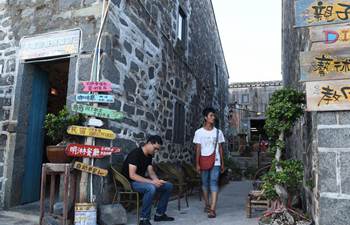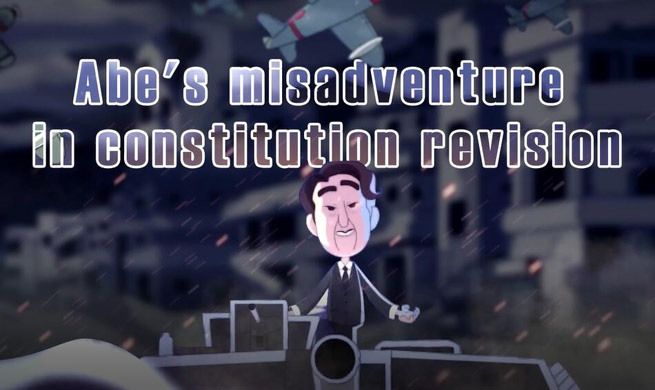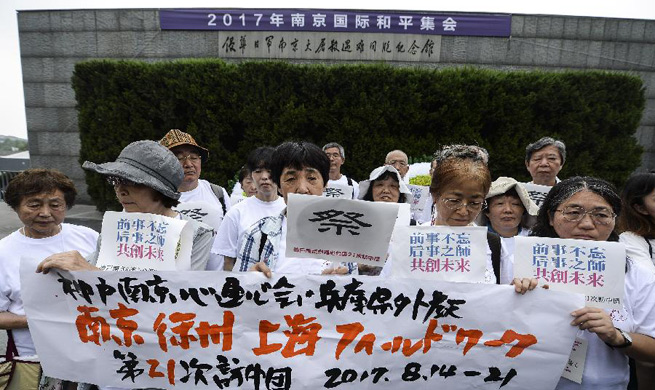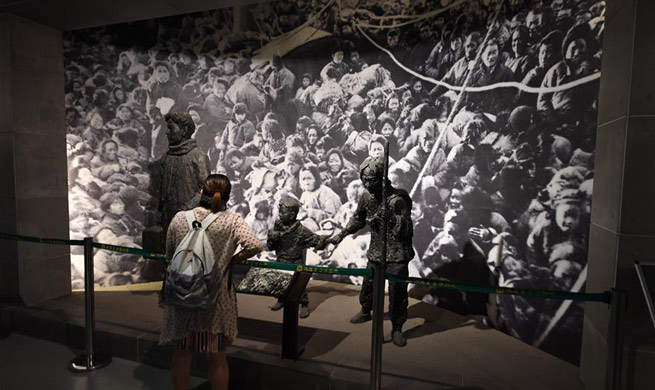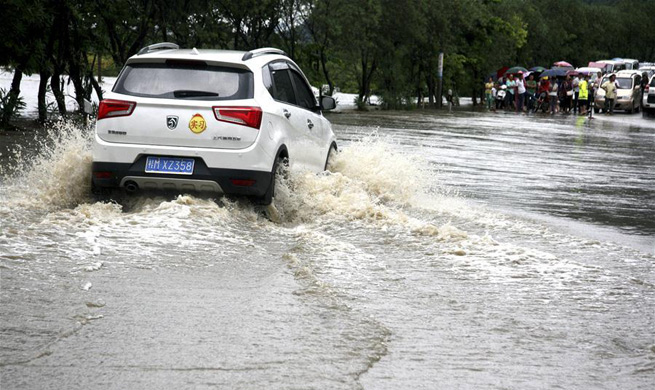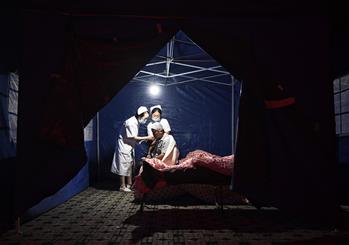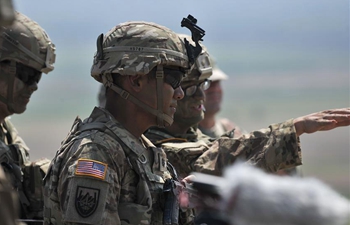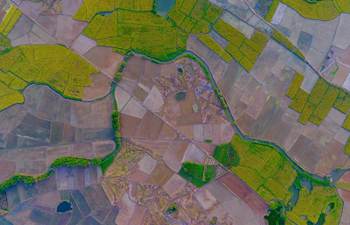ANKARA, Aug. 15 (Xinhua) -- The killing of a 15-year-old teenager in northern Turkey by outlawed Kurdistan Workers' Party (PKK) rebels has caused a public outcry in the country.
It sparks anger towards the United States and European country's accused act of turning a blind eye to the group's bloody actions.
Politicians, artists, NGOs, businessmen and various sport clubs across Turkey have united to condemn the murder of Eren Bulbul last Friday, who was helping security forces track PKK members nearby his house in Macka district of Trabzon province.
This region is not traditional battlefield between government and PKK, a movement listed as a terrorist group by the U.S., European Union (EU) and Turkey.
Macka is a region where there is no Kurdish population. The mountainous area is sparsely populated and quite suitable for armed terrorists to hide.
According to local media, the boy who sustained gunshot wounds had gone to inform the security forces about a group of militants he saw entering a house to steal provisions.
He was then shot by PKK militants while he was returning from showing security officials the suspicious house. A soldier was injured in the same incident and later also died.
The killing of one of the youngest victims of the Kurdish conflict stirred anger and solidarity in Turkish society and across political parties. The PKK launched a bloody campaign for self-rule in 1984, killing not only members of security forces but also civilians, and in the years that past on, children as well.
But in many years such a young civilian victim of the conflict was not registered. And northern provinces on the coast of the Black Sea are known for their nationalist inhabitants, fiercely opposed to the PKK and loyal to the ruling conservative Justice and Development party (AKP) of President Recep Tayyip Erdogan.
Locals hung Turkish flags from windows and balconies to mark the teenager's death and a poster of Eren was hung outside the town hall with the words: "Eren Bulbul, Macka will never forget you. Our martyrs rest in peace."
Several government ministers paid their respect to the family by going there and participating in the young boy's funeral on Saturday, attended by thousands holding the Turkish flag.
All political parties expressed their condolences. The main opposition Republican People's Party (CHP) leader Kemal Kilicdaroglu used his Twitter account to denounce the slaying.
Nationalist MHP party leader Devlet Bahceli wrote for his part on his social media account: "We have to find and destroy the terrorists who have leashes on their necks in where they have been hiding."
The local Trabzonspor football club also condemned the attack via its official Twitter account. "Eren was only 15 years old. We curse terrorism," stated the post.
And the young boy's latest heartbreaking tweet was shared number of times by Turkish social media users. He had wrote that "no one says that so glad I have you Eren" via his twitter account. Following his death, Turkish social media users started to post their tweets with iyikivarsneren (so glad to have you Eren) hashtag.
The pro-government press took on its headlines and columns after this tragic killing hit at the EU's "clement attitude" towards the PKK.
"(EU's) political attitude towards Turkey's war against terrorism remains obscure and prejudiced. Their sympathy appears to be not with Turkey, which has also been an eager candidate for the European Union, but with terrorist organizations," wrote on Monday Ihsan Aktas in Daily Sabah.
"Their sympathy for the PKK, which murdered almost 30,000 civilians over the three decades, is nothing but outrageous," he went on saying, criticizing the leniency that the outlawed group is enjoying among certain European institutions.
A two and half year's ceasefire between the PKK and the Turkish state ended in July 2017 and since then violence has killed about 3,000, announced last month, the International crisis group (ICG), on the second anniversary of the renewed conflict.
This number includes some 980 Turkish security forces, nearly 1,400 rebels, 200 affiliates and 400 civilians.
Analysts say that it is essential to differentiate the Kurdish issue in Turkey and the PKK in order to advance towards a peaceful solution between Turks and Kurds in Turkey.
"Asking for more democracy, pluralism and freedom of expression is a very legitimate right," wrote Bilgi University researcher Emre Gonen Wednesday in Daily Sabah, pointing out that "any lenience shown towards the PKK removes any support such demands may have among the public," adding the necessity to "separate the PKK from the legitimate demands of Turkey's Kurds."
More than 40,000 people have been killed in clashes mainly concentrated in Turkey's mainly Kurdish southeast, as well as various attacks elsewhere in the country since 1984.
The ICG pointed out a possible escalation in the violence in the future due to Turkey's NATO ally the U.S. arming of Kurdish forces in Syria.
The YPG, armed wing of the Syrian Kurdish PYD (Democratic Union Party), is a major U.S. ally fighting the Islamic state (IS) on the ground against jihadist bastion Raqqah in northern Syria, but Turkey alleges the group is an offshoot of PKK and treats it as a terrorist group.
Continuous U.S. support for the YPG has cursed tensions in the already wrinkled ties between Washington and Ankara who fears that arms given to the YPG would fall into PKK's hand.
"Even if just for tactical reasons, the use of a terrorist organization, the YPG, in the Raqqah operation will lead to other terror organisations in the region gaining further ground," warned Turkish foreign minister Mevlut Cavusoglu last week.
Turkey fears that the YGP will permanently hold parts of land in northern Syria after finishing with IS, and possibly create an autonomous Kurdish region there at Turkey's border.
President Erdogan hinted last week a new incursion of armed forces in Syria against the YPG like it did in the past against IS in 2016. No further announcement has been made yet but this is the widespread impression he has given.
Deniz Zeyrek, a prominent Turkish columnist for Hurriyet newspaper commented that Turkey's red lines in Syria where violated by both Russia and the U.S., military active in Syria in different camps, who foresee autonomous Kurdish regions for Kurds in their plan for Syria's future, reminds that like Washington, Moscow refuses to list the YPG as a terrorist organization.
Similar concerns also apply to Iraq, another neighbor of Turkey as well as Iran.
The Iraqi Kurds who control an autonomous region in the north, have been seeking an independent state since the end of World War One. The Kurdish administration has announced on June an independence referendum on September 25th despite opposition of all neighboring countries including Turkey and the U.S. as well.
U.S. Secretary of State Rex Tillerson asked last week in a phone call Regional Government president Massoud Barzani to postpone the vote but reportedly, the plan to hold a referendum will go one.
Washington is worried that the vote could ignite regional tensions while all neighbours of Iraq oppose an independent Kurdistan and would distract from other priorities, which are the Syrian war and the defeat of the Islamic State.
"A referendum will make matters even worse between different factions of Iraq, Kurds, Sunnis and Shiites who already don't get along, and it will also be a threat to the integrity and sovereignty of Iraq," told Xinhua a Turkish diplomatic source, pointing out that disputed areas as the oil-rich Kirkouk town where the Turkmen minority, backed by Ankara lives, should be excluded in such a vote.
"Such a vote, if it does go ahead, will not be legally binding in the international arena and will cause legal and political problems," warned this source, reminding that nearly half of the Kurdistan Region's land is still disputed between the central administration of Bagdad and Erbil, the Iraqi Kurdistan capital.
Amid all these objections, holding a referendum in September will be difficult, if not impossible, argue experts.




